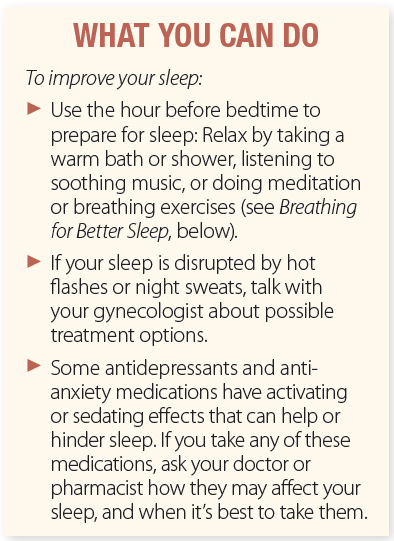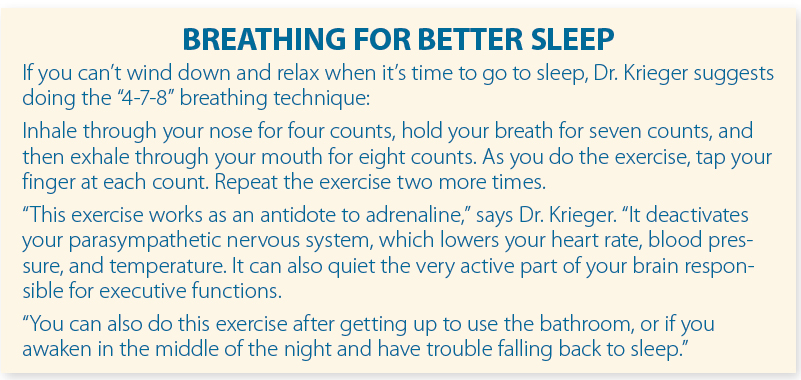How to Get a Better Night’s Sleep
Many Americans are sleeping poorly or not getting enough sleep. More than 25 percent of U.S. adults do not meet the recommendation from the American Academy of Sleep Medicine and the Sleep Research Society to get at least 7 hours of sleep a night. And 14.5 percent of adults reported they had trouble falling asleep most days or every day in the past 30 days, according to data from the National Health Interview Survey.
Those numbers translate into millions of sleep-deprived people, with consequences such as increased risks of auto accidents, falls, and fractures, and a higher incidence of many chronic diseases.
“Research has produced a great deal of data linking adequate sleep with improved health outcomes, including lower risks of cardiovascular disease and dementia,” says Ana Krieger, MD, medical director of the Weill Cornell Center for Sleep Medicine.
Other health benefits of adequate sleep include reduced risks of depression, diabetes, hypertension, kidney disease, and obesity.
Obviously, if sleep can have such a big impact on your health, it’s in your best interests to get the best sleep you can. Here’s how.
Be Proactive
“Everyone wants to know what they can do to get more high-quality sleep,” says Dr. Krieger. “Take a proactive approach: You have more control than you think over many of the factors that affect your sleep.”
She says the most effective strategy is to focus on your behavior and your schedule: “You’ll need to create a healthy sleep environment and choose behaviors that will promote a good night’s sleep.”
You can start by following Dr. Krieger’s suggestions for actions you can take to prioritize and respect sleep:
 Organize your routine with sleep in mind.
Organize your routine with sleep in mind.
 Add sleep to your calendar.
Add sleep to your calendar.
 Set an alarm for one hour before bedtime; during that hour, don’t consume food or alcohol, don’t use electronic devices, and avoid stressful or stimulating activities.
Set an alarm for one hour before bedtime; during that hour, don’t consume food or alcohol, don’t use electronic devices, and avoid stressful or stimulating activities.
 Stick to a sleep schedule; go to bed and wake up at the same time every day.
Stick to a sleep schedule; go to bed and wake up at the same time every day.
 Don’t stay in bed too long; when you wake up in the morning, get up.
Don’t stay in bed too long; when you wake up in the morning, get up.
 Keep your bedroom quiet, cool, and dark at night.
Keep your bedroom quiet, cool, and dark at night.

Reduce Light Exposure
For high-quality sleep, the less light, the better.
Dr. Krieger explains that there are “pacemaker cells”—specialized neurons in the brain—that regulate the circadian rhythm, which is responsible for the sleep-wake cycle, as well as many other essential functions in the body. These cells are sensitive to environmental cues, especially light and dark, and when there’s too much light, it can disrupt the sleep cycle.
The light given off by the screens on electronic devices, such as computers, tablets, and cell phones, is blue light, which has a frequency that disrupts the circadian rhythm.
“The ‘night’ settings on these devices can be helpful, but you still need to avoid using them one hour before bedtime,” Dr. Krieger says. “Also, if you wake in the middle of the night, don’t turn on the lights or check the clock.”
Quiet Your Mind
People who have difficulty falling asleep frequently report being unable to stop racing or anxious thoughts. If you have this problem, Dr. Krieger suggests making a “worry list”: “After lunch, write down all the things you’re worried about, so you can get these thoughts out of your head.” She also recommends using apps like Calm or Headspace to reduce anxiety and relieve stress, or trying a mind-body exercise like yoga or tai chi.
Recording Your Sleep
Many devices, such as the “oura” ring, Fitbits, watches, and bracelets, track sleep—but can they actually identify sleep problems or help you sleep better?
Dr. Krieger notes that many of these devices provide a large amount of data, but they’re not always very accurate: “Keep in mind they are movement trackers, so quiet insomniacs can appear to get more sleep than they do, or restless sleepers might appear to get less sleep than they do.”
She also says that focusing too much attention on your sleep can have a paradoxical effect and make it more difficult to get restful sleep.
“It’s important for people to be aware of the possible health consequences of poor and/or inadequate sleep, but we are walking a fine line: We want to be informative and help people improve their sleep, but we don’t want everyone to worry about their sleep,” she says.
Finally, if you continue to have trouble sleeping, see a sleep specialist. He or she can determine if you have a sleep disorder, and, if so, recommend treatment options that can help.

The post How to Get a Better Night’s Sleep appeared first on University Health News.

